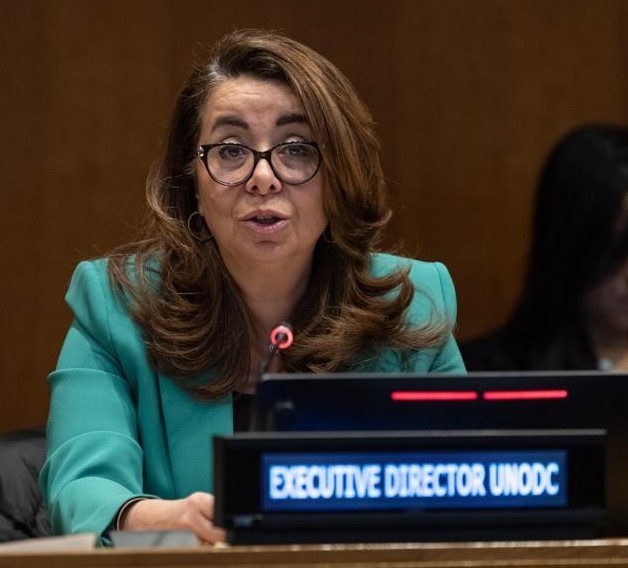
New York, 20 March 2023
On 20 March, the New York Liaison Office of the UN Office on Drugs and Crime (UNODC) hosted the New York Presentation of UNODC's 2022 Global Report on Trafficking in Persons. The findings of this biennial report, noting the drastic impact of the pandemic on trafficking trends and responses, were presented to an audience of representatives from Permanent Missions of member states in New York who heard from an expert panel before sharing their contributions and questions.
Overlapping crises and their potential to render many more millions of people vulnerable to trafficking was a theme addressed by many speakers, including UNODC Executive Director Ms. Ghada Waly. She explained how climate-related loss of food or income and displacement increases vulnerability to trafficking, before outlining how traffickers' links with organized crime and corruption offer a way in to tackling the issue. In his video address, Director General of the International Organization on Migration Mr. António Vitorino pledged to prioritize climate change and conflict as co-chair of the Inter-agency Co-ordination Group Against Trafficking in Persons (ICAT), in recognition of the need to consider how climate change and insecurity impact trafficking.

- UNODC Executive Director Ms. Ghada Waly
The most significant and universal crisis recent years, the Covid-19 pandemic, was at the centre of the Global Report on Trafficking in Persons, which was presented by UNODC’s head of research Ms. Angela Me. The headline finding of a decline in victim-detection during the pandemic was given nuance: lockdown measures may have made trafficking in persons harder and led to a decline, however the drop could also be attributable to law enforcement's diminished capacity during that period, and to practices moving further from public spaces into "more concealed locations", making victims harder to detect. As such, this finding was primarily a concern rather than a success. Ms. Me also shared a breakdown of different victim profiles, types of exploitation, and profiles of perpetrators, in particular noting a rise in cases of forced labor, male victims, and how female perpetrators are more likely to face prosecution and conviction. She outlined how these findings offer a toolkit for more informed police responses, as well as indicators of wider issues that merit further research.
- Ms. Angela Me, Head of UNODC's Research and Analysis Branch

Responding to trafficking will require comprehensive measures on both local, national, and international levels, as was reflected in panellists' contributions. UN Deputy Secretary General Ms. Mohammed cited the report's data indicating growing disparity in states' anti-trafficking capacities, calling for wider development efforts to enable a more equal, comprehensive response to trafficking in persons around the world. The Permanent Representatives of Zambia, the Dominican Republic, and the Philippines called for the strengthening of anti-money laundering legislation in recognition of its role in funelling the profits of trafficking and for greater international police co-operation. Other member states' contributions also featured practical suggestions such as calling on others present to ratify and implement the Palermo Protocol on Trafficking in Persons, and to support UN and international analysis and research by continuing to provide statistical data.
An issue of particular concern was technology and its influence on trafficking. Of the 20 contributions from Member States, several outlined the need for more efforts to raise awareness of the role of technology in trafficking and to enhance law enforcement's technological capacities so that they keep pace with criminal activities in this area. In particular, the Covid-19 pandemic pushing recruitment and exploitation of victims online will require a robust, technologically-oriented response. For the 60 in-person attendees and almost 600 online viewers, this was an informative session which combined concern at the drop in trafficking victims identified with an exchange of specific, positive ideas of responses and a shared commitment to act.
The event is still available to watch online via UN Web TV here.
The 2022 UNODC Global Report on Trafficking in Persons can be found here; there is a very short summary available in the press release here. For more information on UNODC’s work to combat trafficking in persons, please visit the main page on UNODC's website.